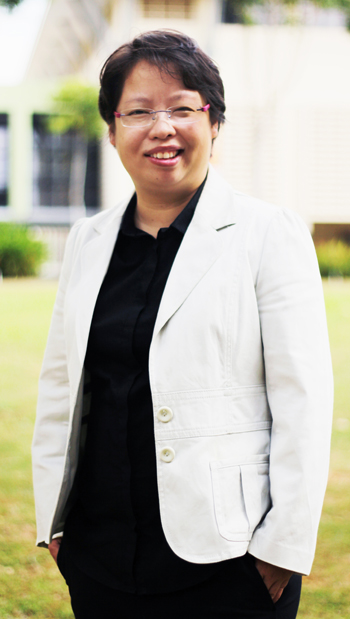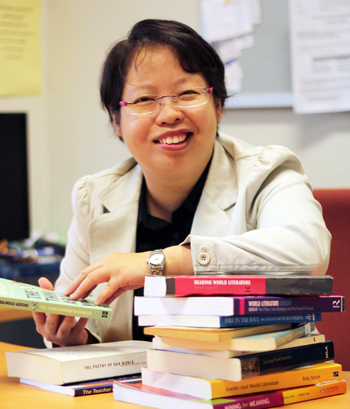Young Children’s Voices in Mathematical Problem Solving
Contributed by Dr Ho Siew Yin and Sng Wei Qin Abbie, from NTUC First Campus, for SingTeach Virtual […]
Read More
How can Literature education continue to remain relevant in our time? For one Literature teacher educator, the answer lies in how we can harness it to teach our students to care about what’s happening in the world today.
 Literature students in Singapore are trained to know the studied literary text inside out. Want to test this out? Randomly pick a passage from the text and show it to them. A good student would likely be able to tell you what it’s all about and dissect for you the plot, and analyse its characters and their motivations.
Literature students in Singapore are trained to know the studied literary text inside out. Want to test this out? Randomly pick a passage from the text and show it to them. A good student would likely be able to tell you what it’s all about and dissect for you the plot, and analyse its characters and their motivations.
This is because our Literature curriculum encourages students to read “deeply” into a work. This emphasis on depth is important, says Dr Suzanne Choo from the English Language and Literature Academic Group in NIE. It is not just about reading a book, but critically appreciating how it has been constructed.
While Literature education has been very effective in inculcating such skills in students, perhaps it can offer even more. Through its connection to cosmopolitanism, Literature can educate students to be responsible citizens of the world.
Decades of rapid globalization have led to increased movements of people and goods around the world, and there have been concerns about the effects of consumerism and immigration. As Suzanne describes it, interest in cosmopolitanism by academics may be seen as an ethical response to such effects.
Students who have a cosmopolitan outlook may more readily empathize with others, even those who are physically or culturally distant. They may feel a greater sense of shared responsibility towards what is happening to their fellow global citizens.
As consumers, when shopping for a smartphone, for example, students may pause and consider how much factory workers in a developing country are being paid to produce such phones, and whether they are being treated fairly.
When students read in the news about a bombing that has taken place in a neighbouring country, they may be concerned about how lives are lost or affected through such acts of violence.
The Internet has made it possible for students to know in an instant what is going on in the world today, but Literature has the potential to make them care.
What is it about Literature that lends itself to cultivating a sense of empathy in students?
“Empathy requires you to look at things from someone else’s perspective. Literature often zooms in on individual lives as opposed to examining abstract ideas or information,” explains Suzanne. Literature cultivates a concern about the lives and experiences of other people.
Also, a good work of Literature doesn’t tell the reader what to think. “It invites you to watch and listen to the ways lives unfold in particular cultural contexts,” describes Suzanne.
“At the same time, the literary text does not tell you how to judge the other. Rather, it presents room for interpretation to allow the reader to participate in its world.”
The “openness” of literary language leaves room for students to interpret, dialogue among themselves and construct meaning from the text.
The literary text should be seen as an entry point to the world.
– Suzanne Choo, English Language and Literature Academic Group
Something Literature teachers can do is to help students make connections between the literary text they are studying and other texts. This will help students see how the key concepts and ideas they learn in the Literature classroom play out in other cultures and contexts.
As Suzanne explains, “The literary text should be seen as an entry point to the world.” Teachers can highlight to students particular moments in their Literature text that can be complemented and disrupted by texts from different cultures. These can include non-fiction texts such as documentaries, memoirs and news articles.
Teachers can encourage students to:
The number of students taking up Literature as a subject at the upper secondary level has declined in recent years. Some see it as a cause for concern. But to Suzanne, it is also an opportunity for educators to rethink the Literature curriculum.
 She thinks that literary texts currently taught in Singapore classrooms often deal with themes such as colonialism, apartheid and American race relations.
She thinks that literary texts currently taught in Singapore classrooms often deal with themes such as colonialism, apartheid and American race relations.
Suzanne often challenges her teachers to think about this: How can our Literature curriculum connect more closely to what is happening in our world today? For example, what do the literary texts have to say about terrorism, immigration, human rights, human trafficking, global warming and the effects of transnational corporations?
A cosmopolitan Literature curriculum that emphasizes deeper empathetic understanding of other cultures will help to foster “hospitable imagination”, in which one responds out of ethical responsibility towards others different from oneself.
A hospitable imagination is becoming increasingly important in Singapore, says Suzanne, because we need to learn how to work, live and study alongside immigrants and foreigners.
“If I’m communicating with someone from another culture, I cannot just communicate intellectually. I need to have particular dispositions, such as openness to learn from and not just tolerate someone from a different race or culture, as well as the capacity to negotiate and appreciate ambiguity,” she points out.
Literature education plays a vital role in preparing our students for the globalized world. It opens up space in the classroom for our students to think deeply about not just the stories they read, but also essential questions about what it means to be a human being and to relate to the others in our interconnected age.